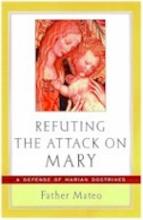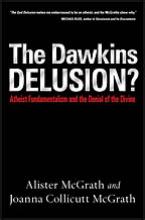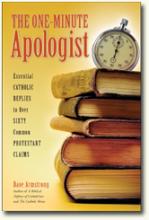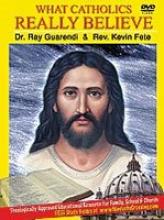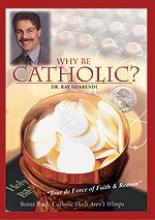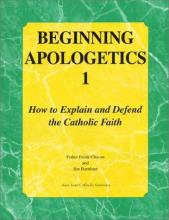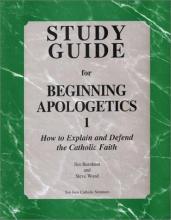Apologetics
Refuting the Attack on Mary
The Dawkins Delusion?
This would be an ideal resource for the student heading off to a secular college, who may encounter those who will attack his Christian beliefs based on atheistic notions.
The One-Minute Apologist
What Catholics Really Believe
13 - 1/2 hour episodes on DVD
Why Be Catholic?
You Can Share the Faith
Friendly Defenders
Each packet of Friendly Defenders Catholic Flash Cards includes 50 cards covering 12 categories: Tradition, Church, Papacy, Eucharist/Mass, Salvation, Purgatory, Baptism, Mary, Saints, Confession, Statues & Holy Objects, and Holy Orders. The purpose of the cards is to assist children, ages 8 and up, and teenagers to be able to defend their faith with clear and easy explanations against the typical questions about the Catholic faith.
On the front of each card is a number and color code, category and topic, a boy or girl (with a memorable name such as Curious Connie) who offers a challenging a question or statement to Catholics. On the back of each card is another boy or girl (with a name such as Joyful Joey) giving a solid Catholic response. There is also a Bible verse and additional comments at the bottom of the card to explain the answer. Also included are Bible references with related Bible verses. For example, in the Category of "Purgatory" and the topic of "Purpose of . . .", Questioning Quincy states, "Purgatory is not necessary. You're either saved or not saved." Gracious Grace gives the reply on the back. "Purgatory is only for the saved. It's a place or state where those who died in God's friendship are made perfect so they can enter heaven of which St. John writes. . . 'Nothing unclean will enter it' (Rev. 21:27).
These cards are unique in that they are not just basic catechism questions, but questions that non-Catholics often have about the Catholic faith and these cards supply young people the tools to effectively reply to those misconceptions. Colorful and contemporary, Friendly Defenders Catholic Flash Cards offer kids a fun way to learn to defend the faith.
Beginning Apologetics 1: How to Explain and Defend the Catholic Faith
When I first considered converting from a "mere Christianity" form of Protestantism to the Catholic faith, I had several issues to deal with. I believed that "Scripture alone" was the rule of faith. I thought that the Catholic Church had added several non-Biblical doctrines throughout the years – for example, praying to Mary and the saints and the existence of Purgatory. Though I knew that Jesus had given the apostles and particularly Simon Peter the power to bind and loose sins and to heal the sick, I couldn't see how Catholics could consider priests, bishops and the Pope to have inherited these powers. I was scandalized by evil people and actions in the Church's history (some real evils and some that were exaggerated).
I vividly remember my surprise and increasing respect for the Church as my husband and I read and discussed a Catholic apologetics book in which these questions were specifically dealt with from a Scriptural and historical perspective. Once I could see intellectually that Catholic doctrines were not just pious accretions and institutionalized hypocrisy, my road to conversion became a lot more direct.
Beginning Apologetics is written to help Catholics dialogue with sincere Protestants like I was, and to help them convey a Catholic perspective on these major issues using support from the Bible, from the writings of the Church Fathers and with the help of logical reasoning from common ground. The book is a simple 8 1/2 by 11 format, inexpensively paper bound, but has a lot of substance packed into its 40 pages. Its tone is reasonable and unconfrontational "Apologetics fulfills the command of St. Peter: Always be ready to give an explanation to anyone who asks you for a reason for your hope, but do it with gentleness and reverence..(1 Peter 3:15-16)".
It begins with an introductory section on method: how to be an effective, charitable apologist for our Faith, and how to read and mark your Bible. The body of the book is laid out topic by topic. The Eucharist, the role and origin of the Bible, and the primacy of the Pope have first priority, because it is from these central points that most of the central divisions of Christendom proceed. For instance, if a Catholic can convince a Protestant that Jesus in John 6 meant His words about His Body and Blood to be taken literally – which indeed is the plain sense of what He said – that in itself is a huge stumbling block removed, because that is a doctrine held only by the Catholic and Orthodox Church. If he can further convince the Protestant that "Scripture alone" is not a Scripturally supported doctrine, and thus contradicts itself, then he has significantly narrowed the separation between the Catholic and the devout and sincere Protestant.
The book goes on to address other questions and misconceptions that a sincere Bible-believing Christian may have about the Catholic Faith. Do Catholics really "worship" Mary? (the answer is no, and our reasons for "venerating" or honoring her are carefully supported from Scripture). Isn't it "necromancy" to pray to the saints in heaven? (again no, and again reasons are laid out proceeding from doctrines that Catholics and Protestants have in common). The manual closes with some briefer questions and answers like "Why do Catholics baptize infants?" and gives a list of recommended resources for further reading and study. Among these are the Catechism of the Catholic Church, and Karl Keating's Catholicism and Fundamentalism which is the apologetics book that first helped me to consider conversion seriously.
This book is one of the resources used by Mother of Divine Grace School for high school religion. It could be profitably read by anyone from 6th or 7th grade up to adulthood. It is a handy reference tool because it lays out the basic issues so simply and concisely, and because it puts the Scriptural references and key terminology in bold font so they are easily located. The book is #1 in a series that now includes 7 books.
See below for a separately sold Study Guide for this book.
Study Guide for Beginning Apologetics 1
This is the Study Guide for Beginning Apologetics 1, reviewed above. It can be used in a discussion group setting or by families or individuals, and contains questions which can be answered by references to the Catechism or to Scripture (the specific passages are cited so students can research them).

